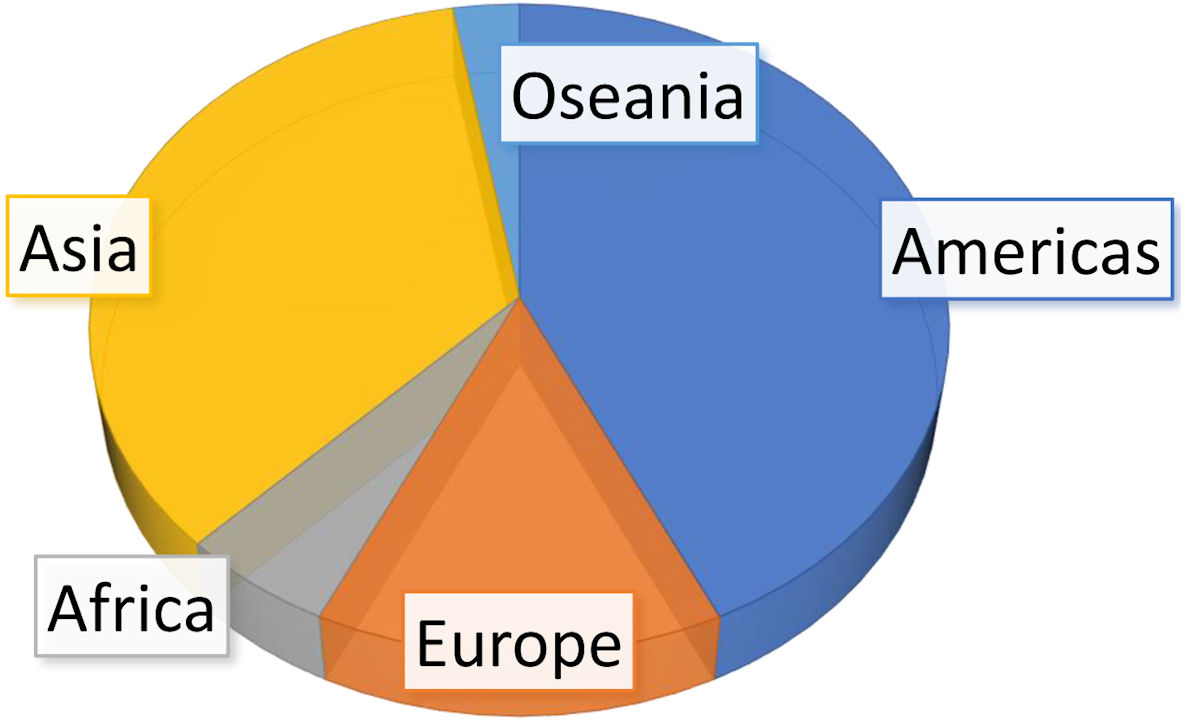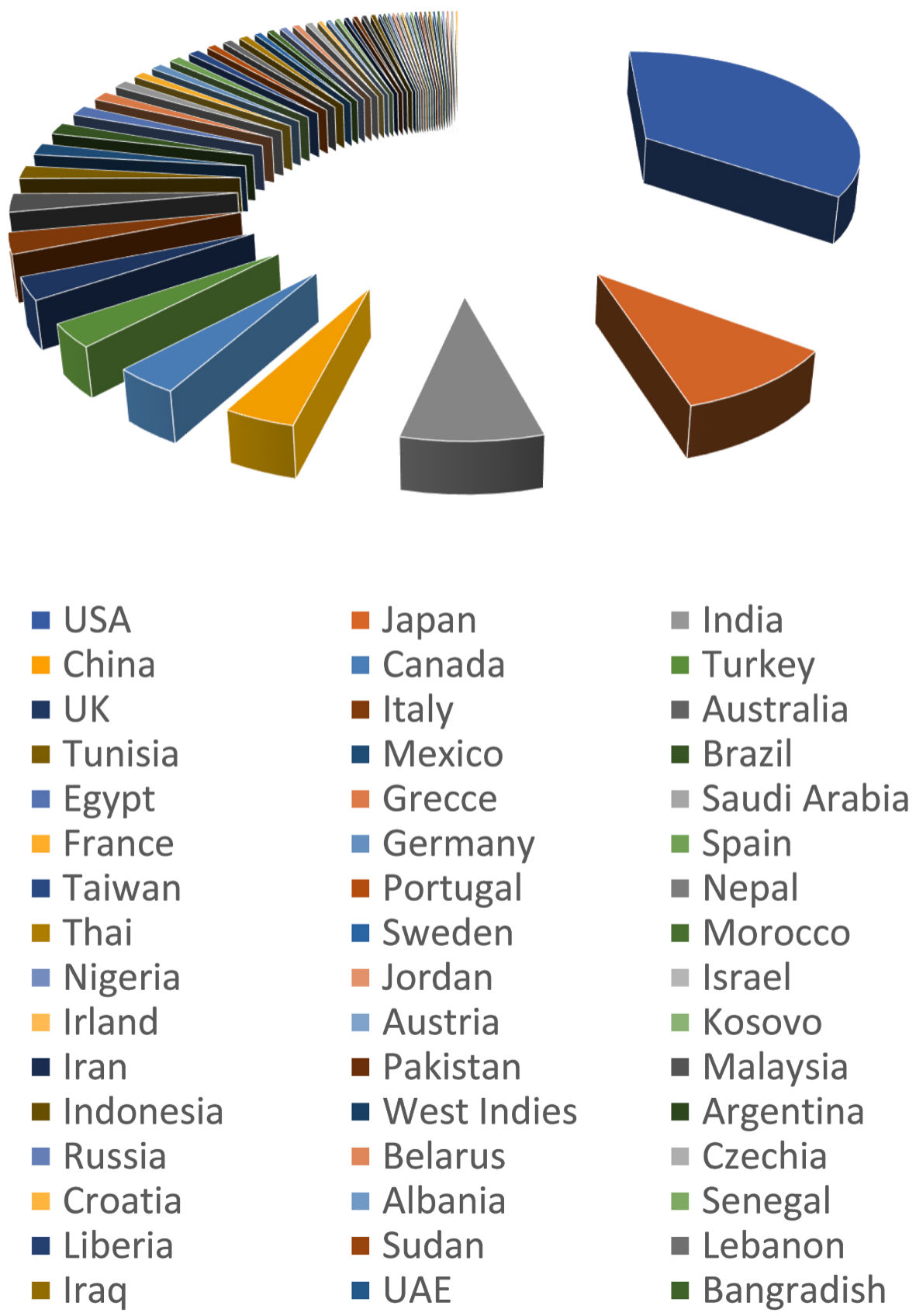| World Journal of Oncology, ISSN 1920-4531 print, 1920-454X online, Open Access |
| Article copyright, the authors; Journal compilation copyright, World J Oncol and Elmer Press Inc |
| Journal website https://www.wjon.org |
Editorial
Volume 13, Number 5, October 2022, pages 241-243
The Dimensions of Reports From Around the World That Address Diversity in Oncology
Kazuaki Takabea, g, Vidalina Daya, Matthew G.K. Benescha
aDepartment of Surgical Oncology, Roswell Park Comprehensive Cancer Center, Buffalo, NY 14263, USA
bDepartment of Surgery, University at Buffalo Jacobs School of Medicine and Biomedical Sciences, The State University of New York, Buffalo, NY 14263, USA
cDepartment of Breast Surgery and Oncology, Tokyo Medical University, Tokyo 160-8402, Japan
dDepartment of Gastroenterological Surgery, Yokohama City University Graduate School of Medicine, Yokohama, Kanagawa 236-0004, Japan
eDepartment of Surgery, Niigata University Graduate School of Medical and Dental Sciences, Niigata, Japan
fDepartment of Breast Surgery, Fukushima Medical University, Fukushima, Japan
gCorresponding Author: Kazuaki Takabe, Department of Surgical Oncology, Roswell Park Comprehensive Cancer Center, Buffalo, NY 14263, USA
Manuscript submitted October 7, 2022, accepted October 12, 2022, published online October 22, 2022
Short title: Diversity in Oncology
doi: https://doi.org/10.14740/wjon1535
Reproducibility is one of the major principles of science. Scientific findings should be reproducible anywhere in the world. Based on this principle, basic researchers tend to assume that cancer biology is the same for all populations regardless of location, race, or ethnicity. Unfortunately, this is not the case. In reality, cancer biology is extremely heterogenous and diverse secondary to host epidemiological factors, such as age, gender, race, and ethnicity. For example, it is well known that breast cancer incidence is higher in younger African Americans and Asians compared to Caucasian women, and these patients also have higher rates of triple-negative subtypes [1].
Medical practice is based on evidence, where the results of randomized clinical trials are given the ultimate consideration. Although there is no doubt that evidence-based medicine is far superior to experience-based or authoritarian ways of practicing medicine, it unfortunately does have weaknesses. The results of clinical trials only reflect the cohort in which it was studied. In other words, adverse effects of a drug that is unique to a minority of a cohort will not be highlighted in the trial results and may be neglected during the dissemination of the new research findings. This tragedy did occur when the safety and efficacy of an epidermal growth factor (EGFR)-tyrosine kinase inhibitor (TKI), gefitinib (Iressa) was clearly demonstrated against EGFR L858R-mutated non-small cell lung cancer by a multi-institutional controlled randomized clinical trial, the Iressa Pan-Asia Study (IPASS, NCT00322452 [2]), where Japanese patients comprised less than 20% of the study population. An additional trial, a single-arm study (IFUM, NCT01203917 [3]), included only Caucasians. The positive results of these trials led both the European Medicines Agency and the United States Food and Drug Administration to approve gefitinib, followed thereafter by an accelerated approval in Japan. What then happened was that many Japanese patients died of interstitial lung disease after gefitinib treatment, making headlines and generating public mistrust. It was later found that the incidence of acute exacerbation of interstitial lung disease induced by EGFR-TKIs such as gefitinib was significantly higher among Japanese patients than other ethnic cohorts, even when compared to Korean or Taiwanese patients [4-6], who are considered ethnically very close to Japanese. Unfortunately, this high rate of toxicity among Japanese patients was never highlighted in the clinical trials because Japanese participants were a minority in these investigations.
One of the ways to avoid this kind of tragedy is to promote reports from different part of the world. As the title of our journal indicates, we wish to be the front runner in that honorable role. Since our establishment in 2010, our journal has published a total of 509 articles from all the continents except Antarctica: 218 from the Americas, 71 from Europe, 27 from Africa, 177 from Asia, and 14 from Oceania (Fig. 1). Although the top six countries, United States (178), Japan (53), India (43), China (22), Canada (20) and Turkey (18), were the origins of two-thirds of the publications, our journal has published articles from a total of 52 countries throughout the world, reflecting the diversity of our publications (Fig. 2).
 Click for large image | Figure 1. The continents of origin of the articles published in the World Journal of Oncology. Dark blue illustrates the ratio from the Americas, orange from Europe, gray from Africa, yellow from Asia, and light blue from Oceania, respectively. |
 Click for large image | Figure 2. Numbers of articles published in the World Journal of Oncology (2010 - 2022) from each country: USA 178, Japan 53, India 43, China 22, Canada 20, Turkey 18, UK 17, Italy 16, Australia 14, Tunisia 10, Mexico 9, Brazil 9, Egypt 8, Greece 7, Saudi Arabia 6, France 5, Germany 5, Spain 5, Taiwan 5, Portugal 4, Nepal 4, Thailand 4, Sweden 3, Morocco 3, Nigeria 3, Jordan 3, Israel 3, Ireland 2, Austria 2, Kosovo 2, Iran 2, Pakistan 2, Malaysia 2, Indonesia 2, West Indies 1, Argentina 1, Russia 1, Belarus 1, Czechia 1, Croatia 1, Albania 1, Senegal 1, Liberia 1, Sudan 1, Lebanon 1, Iraq 1, UAE 1, Bangladesh 1, Korea 1, Vietnam 1, Singapore 1, Philippines 1, respectively. UAE: United Arab Emirates. |
Further, our journal has been diligently publishing articles that highlight racial and ethnic diversity. Padala et al from the United States reviewed the epidemiology of renal cell carcinoma around the world [7]. Adeniji et al from Nigeria collaborated with colleagues from Nepal and the United States and reviewed the barriers and how to improve personalized medicine in oncology in the developing world [8]. Dulal et al from Nepal reported the feasibility of fewer fraction palliative radiotherapy in a resource-limited setting [9]. Alqahtani et al from Saudi Arabia in collaboration with his colleagues from Sudan reviewed the risk factors of oral and oropharyngeal cancers in Gulf Cooperation Council countries [10]. Given that breast cancer subtype is so closely connected with response to specific treatments, and because its distribution differs by race and ethnicity, Copeland et al reported on its distribution among Jamaicans [11], Adeniji et al reported that of Nigerians [12], and Macari et al of Mexicans [13]. From Mexico, Hernandez-Ruiz et al reviewed the epidemiology of non-Hodgkin’s lymphoma [14], Fernandez-Ferreira et al reported that epithelial-cadherin expression is associated with better survival in invasive lobular breast cancer [15], Fernandez-Garza et al reviewed applications of personalized medicine in ovarian cancer [16], and Dupont et al reported the relationship of laterality to testicular germ cell tumor survival [17]. Lastly, we published a review article on a conference held at the Japan Embassy on cancer and infectious diseases between the United States and Japan [18].
World Journal of Oncology has been and will continue to be the front runner in promoting and publishing reports from all parts of the world.
Acknowledgments
None to declare.
Financial Disclosure
This research was supported by grants from the United States National Institutes of Health (R37CA248018, R01CA250412, R01CA251545, and R01EB029596) and the US Department of Defense (BCRP W81XWH-19-1-0674 and W81XWH-19-1-0111) to KT. The National Cancer Institute Cancer Center Support Grant P30CA016056 supports Roswell Park Comprehensive Cancer Center.
Conflict of Interest
None of the authors has any conflict to any entity in regard to the content of this editorial.
Author Contributions
Conceptualization and design of study: KT. Data acquisition: VD. Editing of the paper: KT and MGKB.
Data Availability
The data supporting the findings of this study have been deposited in PubMed and can be accessed free via internet. All the data were acquired through PubMed, a public database of published literature.
| References | ▴Top |
- Yedjou CG, Sims JN, Miele L, Noubissi F, Lowe L, Fonseca DD, Alo RA, et al. Health and racial disparity in breast cancer. Adv Exp Med Biol. 2019;1152:31-49.
doi pubmed - Mok TS, Wu YL, Thongprasert S, Yang CH, Chu DT, Saijo N, Sunpaweravong P, et al. Gefitinib or carboplatin-paclitaxel in pulmonary adenocarcinoma. N Engl J Med. 2009;361(10):947-957.
doi pubmed - Douillard JY, Ostoros G, Cobo M, Ciuleanu T, McCormack R, Webster A, Milenkova T. First-line gefitinib in Caucasian EGFR mutation-positive NSCLC patients: a phase-IV, open-label, single-arm study. Br J Cancer. 2014;110(1):55-62.
doi pubmed - Kudoh S, Kato H, Nishiwaki Y, Fukuoka M, Nakata K, Ichinose Y, Tsuboi M, et al. Interstitial lung disease in Japanese patients with lung cancer: a cohort and nested case-control study. Am J Respir Crit Care Med. 2008;177(12):1348-1357.
doi pubmed - Beom SH, Kim DW, Sim SH, Keam B, Park JH, Lee JO, Kim TM, et al. Gefitinib-induced interstitial lung disease in korean lung cancer patients. Cancer Res Treat. 2016;48(1):88-97.
doi pubmed - Chang SC, Chang CY, Chang SJ, Yuan MK, Lai YC, Liu YC, Chen CY, et al. Gefitinib-related interstitial lung disease in Taiwanese patients with non-small-cell lung cancer. Clin Lung Cancer. 2013;14(1):55-61.
doi pubmed - Padala SA, Barsouk A, Thandra KC, Saginala K, Mohammed A, Vakiti A, Rawla P, et al. Epidemiology of renal cell carcinoma. World J Oncol. 2020;11(3):79-87.
doi pubmed - Adeniji AA, Dulal S, Martin MG. Personalized medicine in oncology in the developing world: barriers and concepts to improve status quo. World J Oncol. 2021;12(2-3):50-60.
doi pubmed - Dulal S, Adeniji AA, Martin MG. Feasibility of fewer fraction palliative radiotherapy in resource-limited setting. World J Oncol. 2020;11(2):76-77.
doi pubmed - Alqahtani WS, Almufareh NA, Al-Johani HA, Alotaibi RK, Juliana CI, Aljarba NH, Alqahtani AS, et al. Oral and oropharyngeal cancers and possible risk factors across gulf cooperation council countries: a systematic review. World J Oncol. 2020;11(4):173-181.
doi pubmed - Copeland J, Oyedeji A, Powell N, Cherian CJ, Tokumaru Y, Murthy V, Takabe K, et al. Breast cancer in jamaica: stage, grade and molecular subtype distributions across age blocks, the implications for screening and treatment. World J Oncol. 2021;12(4):93-103.
doi pubmed - Adeniji AA, Dawodu OO, Habeebu MY, Oyekan AO, Bashir MA, Martin MG, Keshinro SO, et al. Distribution of breast cancer subtypes among nigerian women and correlation to the risk factors and clinicopathological characteristics. World J Oncol. 2020;11(4):165-172.
doi pubmed - Macari A, Soberanis-Pina P, Varela-Santoyo E, Valle-Sanchez MA, Leal-Hidalgo JL, Torres-Guillen VM, Motola-Kuba D, et al. Prevalence and molecular profile of breast carcinoma using immunohistochemistry markers in Mexican women. World J Oncol. 2021;12(4):119-123.
doi pubmed - Hernandez-Ruiz E, Alvarado-Ibarra M, Juan Lien-Chang LE, Banda-Garcia L, Aquino-Salgado JL, Barragan-Ibanez G, Ramirez-Romero EF, et al. Epidemiology and clinical characteristics of non-hodgkin lymphoma in Mexico. World J Oncol. 2021;12(1):28-33.
doi pubmed - Fernandez-Ferreira R, Dorantes-Heredia R, Motola-Kuba D, Ruiz-Morales JM, Alvarado-Luna G, Kinney-Novelo IM, Munoz-Montano WR, et al. Epithelial-cadherin expression is associated with better recurrence-free and overall survival in invasive lobular breast cancer in Mexican women. World J Oncol. 2021;12(6):214-224.
doi pubmed - Fernandez-Garza LE, Dominguez-Vigil IG, Garza-Martinez J, Valdez-Aparicio EA, Barrera-Barrera SA, Barrera-Saldana HA. Personalized medicine in ovarian cancer: a perspective from Mexico. World J Oncol. 2021;12(4):85-92.
doi pubmed - Davila Dupont D, Motola Kuba D, Alcantara Velarde TLM, Martinez Castaneda EA, Dorantes Heredia R, Ruiz Morales JM. Impact of testicular germ cell tumor laterality on recurrence-free survival in the mexican population. World J Oncol. 2021;12(5):173-177.
doi pubmed - Nakano H, Miyamoto T, Janjigian YY, Mine S, Mitsuya H, Ueno NT, Sharon E, et al. Advances in oncology in US and Japan: focusing on cancer and infectious diseases. World J Oncol. 2021;12(6):183-194.
doi pubmed
This article is distributed under the terms of the Creative Commons Attribution Non-Commercial 4.0 International License, which permits unrestricted non-commercial use, distribution, and reproduction in any medium, provided the original work is properly cited.
World Journal of Oncology is published by Elmer Press Inc.


